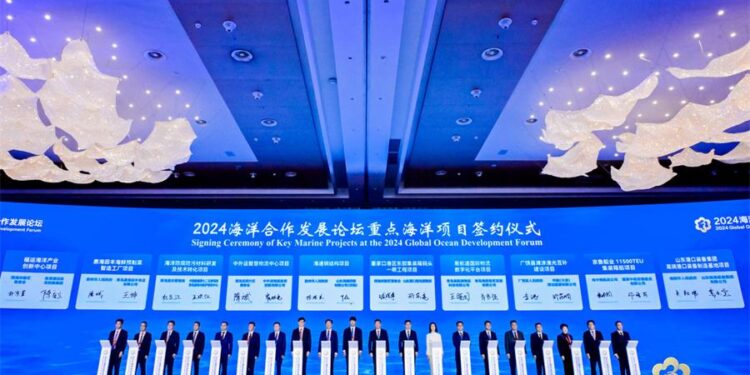Introduction:
In a significant gathering aimed at addressing the pressing challenges facing the world’s oceans, the 2025 Global Ocean Development Forum opened its doors in Qingdao, China, this week. Hosted by a consortium of international organizations and governments, the forum brings together policymakers, scientists, environmentalists, and industry leaders from around the globe to discuss sustainable solutions for ocean health and conservation. With rising temperatures, plastic pollution, and the effects of climate change threatening marine ecosystems, the discussions at this pivotal event are poised to shape the future of global ocean governance and collaborative conservation efforts. As delegates exchange ideas and forge partnerships, the spotlight is on Qingdao, which is emerging as a key player in the global dialogue on ocean sustainability.
Global Leaders Gather to Address Ocean Sustainability at Qingdao Forum
Leaders from around the globe have converged in Qingdao, China, for a pivotal forum aimed at enhancing ocean sustainability amid escalating environmental challenges. With the ocean covering over 70% of the Earth’s surface, the discussions emphasize the crucial need for international cooperation to combat the dual threats of climate change and marine pollution. Attendees, including governmental representatives, environmentalists, and academic experts, are dedicating their efforts to propose actionable frameworks that will safeguard marine ecosystems while fostering economic growth through sustainable practices.
Key topics on the agenda include:
- Marine Biodiversity Conservation: Strategies to protect endangered species and habitats.
- Sustainable Fisheries: Regulations to ensure fish stocks are harvested responsibly.
- Plastic Pollution Management: Initiatives to reduce marine debris and improve waste management.
- Climate Resilience: Innovative solutions to strengthen coastal communities against climate threats.
| Country | Key Initiatives Announced |
|---|---|
| United States | New ocean conservation grants |
| Australia | Increased marine protected areas |
| India | Coastal pollution reduction project |
| Brazil | Support for sustainable fisheries |
Key Challenges and Innovations in Marine Conservation Discussed
The forum highlighted several key challenges facing marine conservation efforts globally. Among these challenges are:
- Overfishing: Unsustainable fishing practices continue to deplete fish stocks and disrupt marine ecosystems.
- Pollution: Plastics and chemical runoff threaten marine life and coastal habitats, with alarming rates of marine debris found in oceans.
- Climate Change: Rising ocean temperatures and acidification are altering marine biodiversity and habitats, leading to ecosystem imbalance.
- Habitat Destruction: Coastal development and damaging fishing techniques result in the loss of critical habitats such as coral reefs and mangroves.
Amid these challenges, the event also presented innovative solutions aimed at bolstering marine conservation efforts. Significant advancements include:
- Marine Protected Areas (MPAs): Expanding MPAs to cover more ocean territory has shown promise in restoring biodiversity.
- Community Engagement: Involving local communities in conservation initiatives ensures sustainable practices and enhances stewardship.
- Technology Integration: Utilizing AI and satellite monitoring for tracking illegal fishing holds the potential to improve enforcement efforts.
| Innovation | Description |
|---|---|
| Drone Surveillance | Easily monitor hard-to-reach marine areas for illegal activities. |
| Biotechnology | Develop methods for restoring coral reefs using resilient species. |
| Marine Spatial Planning | Strategically design ocean use to minimize conflicts and preserve ecosystems. |
Collaborative Strategies for Future Ocean Governance Proposed
As global leaders and policymakers convene in Qingdao, innovative collaborative strategies are gaining momentum in the discourse on ocean governance. The forum highlights the necessity for multi-stakeholder partnerships that bridge governmental, scientific, and community inputs to ensure sustainable ocean resources management. Among the proposed methodologies are:
- Integrated Coastal Zone Management: A holistic approach that encompasses both ecosystem health and community needs.
- Transboundary Cooperation: Initiatives that promote shared resource management across nations to address maritime challenges collectively.
- Public-Private Partnerships: Engaging businesses in sustainability efforts that balance economic growth with environmental stewardship.
Additionally, experts emphasize the importance of utilizing technology for better ocean monitoring and stakeholder engagement. The integration of innovative tools such as satellite imagery and data analytics can transform our understanding of oceanic changes and human impacts. The table below illustrates key technology applications proposed in this collaborative framework:
| Technology | Application |
|---|---|
| Satellite Monitoring | Real-time tracking of illegal fishing activities |
| Blockchain | Transparent tracking of seafood supply chains |
| AI Analytics | Predicting ecosystem changes to inform policy decisions |
Concluding Remarks
In conclusion, the 2025 Global Ocean Development Forum, hosted in the picturesque city of Qingdao, China, marks a significant milestone in the international discourse on ocean sustainability and governance. As leaders, scientists, and stakeholders gather to share insights and forge collaborative strategies, the forum sets the stage for pivotal initiatives aimed at addressing the pressing challenges facing our oceans. As discussions unfold, the emphasis on innovation, policy reform, and community engagement highlights a unified resolve to protect and preserve our planet’s vital marine ecosystems. The outcomes of this forum will undoubtedly influence global ocean management practices for years to come, underscoring the critical need for collective action in the face of environmental change.














